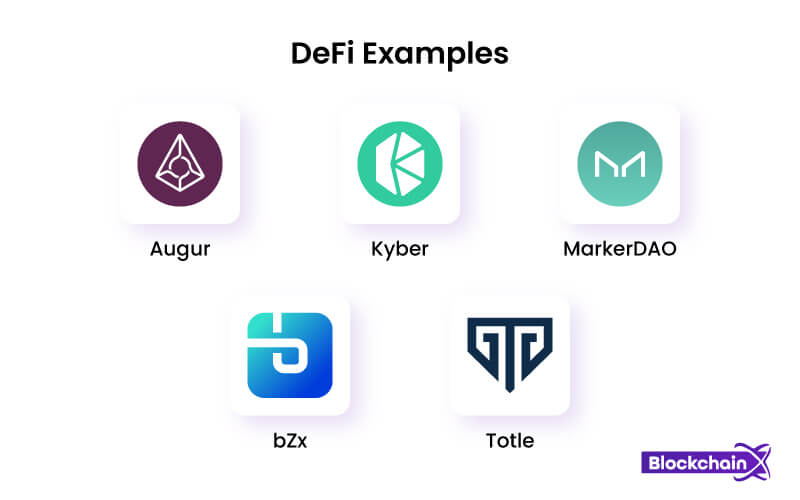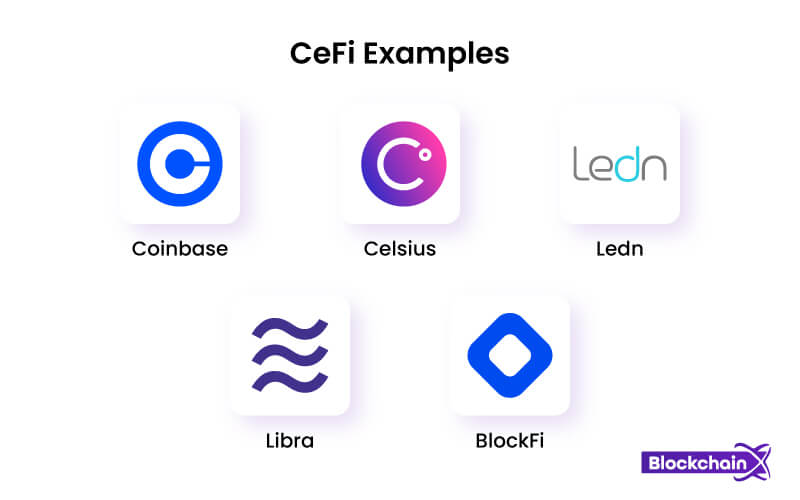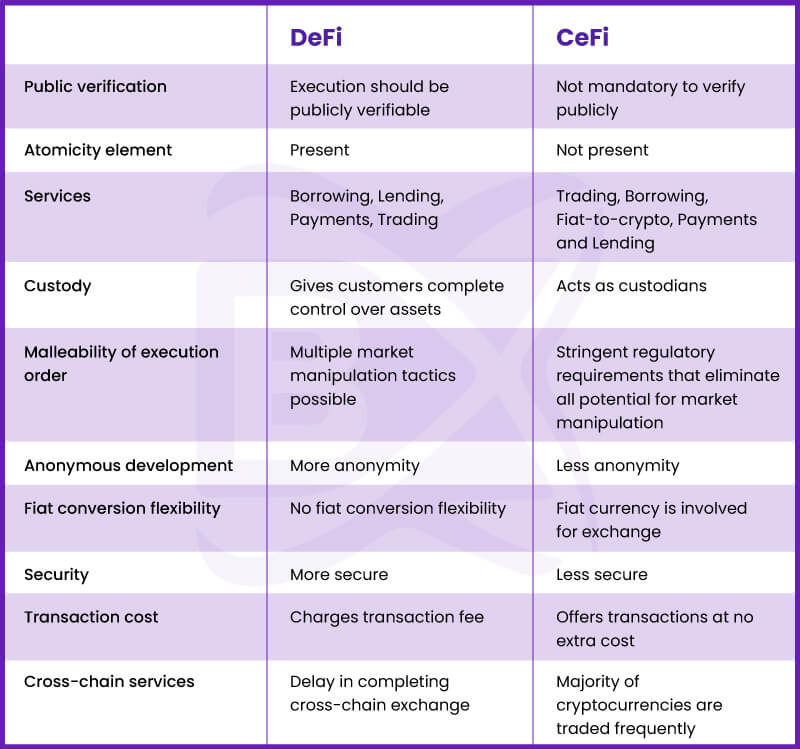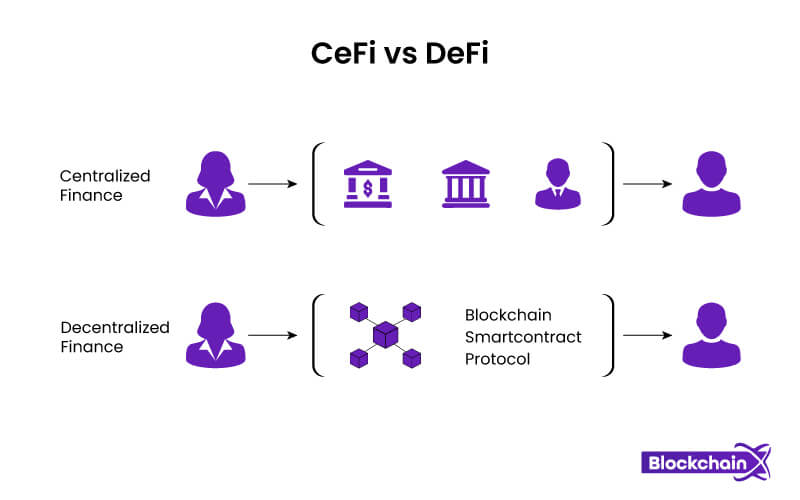DeFi vs CeFi : What are they and which one is suitable for your business
31 OCT, 2022Bitcoin and other digital currencies have created an entire ecosystem around blockchain technology. So the world argues that decentralized financial solutions will eventually replace traditional financial services. Only the future will tell whether it will happen or not, but what we are seeing now is a new competition growing directly within the blockchain ecosystem. The competition is titled "DeFi vs CeFi," or "centralized vs decentralized cryptocurrency."
While CeFi has been the primary mode of cryptocurrency trading for some period, DeFi is increasingly gaining popularity among investors who are concerned about the authority, uniformity, and control of centralized exchanges. But does this mean CeFi will lose its attraction to DeFi? Let's figure out the answer by comparing them.
What distinguishes DeFi from CeFi?
Despite the fact that DeFi and CeFi have significant distinctions, the question is whether users should trust technology or people.
Users of DeFi have faith that the technology will work as expected in order to carry out the services being offered. On CeFi, on the other hand, users trust a business's people to manage funds and provide services.
DeFi and CeFi both provide a wide range of cryptocurrency-related financial services. Let's go through some of the characteristics and examples that distinguish both ecosystems from one another.
What is DeFi (Decentralized Finance)?
DeFi is a global and open financial system that brings transparency and accessibility to the global financial market. Trading, insurance, lending, money issuance, staking, payments, financial data, over-the-counter (OTC) trading, asset management, and other services are available through DeFi.
Working on DeFi blockchains is advantageous because there is no central authority to allow or refuse access. Instead, DeFi cryptos enable peer-to-peer transactions that do not require the involvement of a third party.
DeFi characteristics
Trustless - The main advantage of DeFi cryptos is that they are trustless. You can simply audit the code and use tools like Etherscan to verify that your transaction was completed and that the DeFi services are functioning properly.
Permissionless - Anyone from anywhere in the world can use the DeFi blockchains without seeking approval or acceptance. Furthermore, decentralized banking platforms provide better accessibility and opportunities for community interaction.
Quick innovation - The DeFi crypto list is filled with examples of capabilities being created and tested. The ecosystem as a whole is filled with innovative financial services.
DeFi platform examples

Totle
A decentralized liquidity aggregator with automatic price optimization.
Augur
A prediction market that is decentralized.
Nexus Mutual
A decentralized insurance tool
Kyber
A decentralized exchange
MakerDAO
A platform for minting and lending decentralized stablecoins.
bZx
A platform for decentralized margin lending and trading.
What is CeFi (Centralized Finance)?
CeFi, or Centralized Finance, refers to the practice of entrusting centralized companies, like cryptocurrency exchange platforms, with the storage and management of your funds.
To comply with the regulations of the jurisdictions, most CeFi service providers have a Know Your Customer (KYC) and Anti-Money Laundering (AML) policy in place. It implies that you have to share your personal information with them and ensure that your funds are not being used for illicit purposes. While CeFi crypto platforms free you of the burden of crypto management, they have restrictions like you don’t have any power, standardization, or control over your cryptos.
CeFi characteristics (Centralized Finance )
Customer support is seamless - Each centralized exchange has an internal account for managing users' funds. Furthermore, large CeFi companies protect users' data and provide assistance to customers through a specialized customer support team, increasing confidence.
Flexible conversion - CeFi facilitates the conversion of fiat currency to cryptocurrency. The simplicity of platforms leads to increased client onboarding, as demonstrated by coinbase and its 89 million global users.
Interoperability - By using funds in custody from several chains, CeFi provides simple lending, trading, borrowing, and payment-based services.
Cross-chain swap services - Centralized finance enables cryptocurrency trading on the basis of independent blockchain platforms. While DeFi falls short because of the complexity and delays associated with completing cross-chain swaps, CeFi secures asset custody from many chains.
Centralized Exchange (CEX) - The centralized exchange allows you to manage your portfolio through an internal account while avoiding blockchain transaction costs. Furthermore, since the funds are traded on the exchange, you don't have to worry about the management.
CeFi examples

Coinbase
A cryptocurrency exchange that allows for trading, borrowing, margin trading, native stablecoin, lending, payments, and other services.
FairlayIt
A cryptocurrency prediction market and exchange based on the CeFi model.
BlockFiA
A platform for lending and borrowing in cryptocurrencies and fiat.
Celsius
A cryptocurrency lending and borrowing platform.
Ledn
An insured Bitcoin-to-DAI lending and borrowing platform.
Libra
A worldwide financial infrastructure and cryptocurrency layer.
DeFi vs CeFi: The key differences

Although both centralized and decentralized finance aim to increase the global adoption of blockchain, there are some significant differences between the two. Let's compare DeFi vs CeFi and see what they have in common.

Even though there are some significant differences between centralized and decentralized finance, it is difficult to imagine a scenario in which only one architecture exists.
In Summary
The same goal is sought for both centralized and decentralized financial systems. They want to increase trading volume and popularize cryptocurrencies, while building innovative financial products. However, these two ecosystems accomplish their goals in different ways. Each one has its own set of benefits and drawbacks. If privacy and transparency are crucial to you, go with DeFi, and if you want more flexibility and to share risks with other users of the blockchain network, choose CeFi .